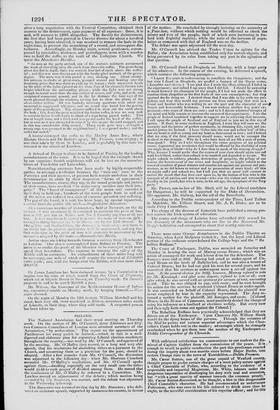I ItE LAN D.
The National Association bad their usual meeting on Thursday week. On the motion of Mr. O'Connell, three Aldermen and fifty- two Common-Councilmen of London were admitted members of the Association, "by acclamation." The report on the appointment of Pacificators for every parish in Ireland,—which in fact is a well- digested and elaborate plan for organizing Liberal election-machinery throughout the country,—was read by Mr. O'Connell, and approved of by the meeting. Mr. O'Malley then moved, in a long and very able speech, that his resolutions for abolishing tithes as a payment to the Church, and preserving them as a provision for the poor, should be adopted. After a few remarks from Mr. O'Connell, the discussion was adjourned to the following day : when Mr. Sharman Crawford seconded Mr. O'Malley's resolutions, and Mr. O'Connell spoke against them,—dwelling especially on the very small sum the tithes would yield to each pauper if divided among them. He moved that the resolutions of Mr. O'Malley be referred to a Committee. Mr. Lawless moved an adjournment of the debate; which motion being seconded by ATI-. Stem:ton, was carried, and the debate was adjourned to the Wedeesday follow big.
The discussion wits resumed on that day by Mr. Staunton ; who deli- vered an elaborate speech, supported by numerous documents, in favour
of the motion. He concluded by strongly insisting on the necessity of a Poor-law, without which nothing would be effectual to check the misery and vice of the people, both of which were increasing in Ire. land with frightful rapidity, while the ratio of the increase of popu. lation as compared with that of England was on the decline.
The debate was again adjourned till the next day.
Mr. O'Connell has advised the Trades Union to agitate for the Ballot ; the Association being established only for certain objects, and being prevented by its rules from taking any part in the agitation of that question.


























 Previous page
Previous page